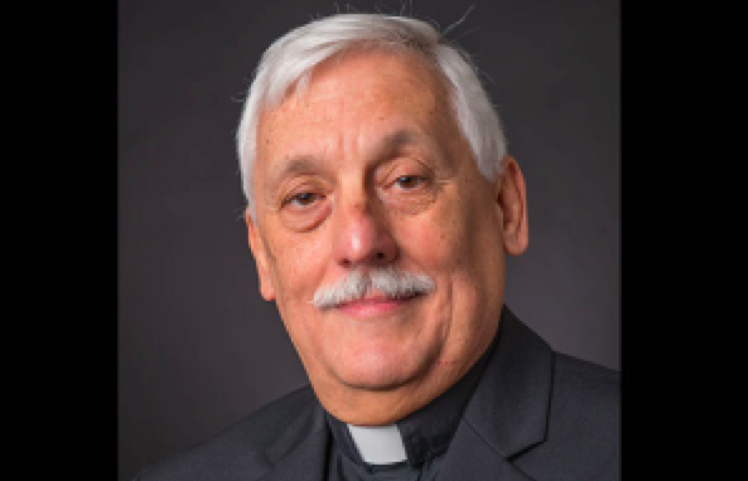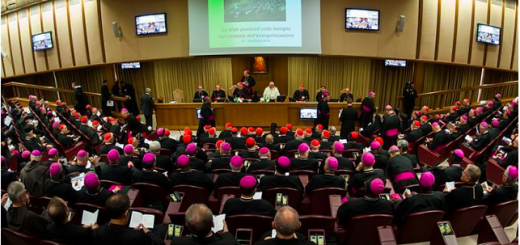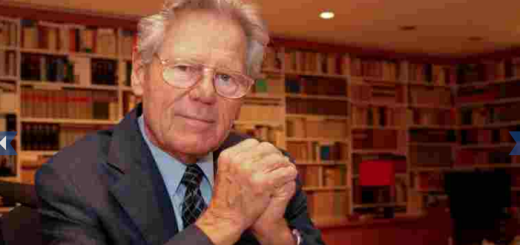‘Black pope’ elect is Venezuelan Fr Sosa

Latin American moment for Catholicism after Jesuits elect Venezuelan 'Black Pope'
By Christopher Lamb, in The Tablet, UK, 14 October 2016
Venezuelan Fr Arturo Sosa Abascal is the new leader of Jesuits, known also as ‘Black pope’
(Note: Impotant to note here is that the head of the Jesuit order is known as the “Black Pope” because of the Order’s global influence like Papacy itself and he, like Francis happens to be also from South America, Venezuela. 212 Jesuits from 66 countries elected Venezuelan Fr Arturo Sosa Abascal as the 36th General of the Congregation of 16,400 members (the number has almost halved since the 1960s) the world over in a conclave akin to one electing a Pope in the Aula of the Jesuit Curia, just steps from the Vatican. He is the 31st successor to St Ignatius of Loyola, who founded the missionary order in 1540.
Some say that Jesuits today should worry more about strategy than numbers, while others say the Society should focus on social justice. In any case Jesuits are working mostly in the educational sector and are known to be intellectuals with the result anyone who writes some sense is immediately branded a Jesuit. Proof? Some 40 years ago a foreign reader of the New Leader described this Idiot: “A Jesuit, grey haired, wearing spectacles and well read in Seven story mountains of Mystic Avila” etc. I was none of that 40 years ago or even now. Fortunately he has never seen me nor I him. On the other hand a simple saintly soul, Cardinal Parecattil, at a casual meeting at Church in India Seminar in B’lore told me straight: “You are too young to be Editor of New Leader.” Archbishop Louis Mathias who sent me to study  Journalism did not think so. Surprisingly I was the first to interview the great Parecattil of simplicity, the first Cardinal of Syromalabar Church, at Archbishop’s house Chennai where he stayed over night on his return from Rome as Cardinal. These are some of the unbelievable jokes of life besides being facts. James kottoor, editor)
Journalism did not think so. Surprisingly I was the first to interview the great Parecattil of simplicity, the first Cardinal of Syromalabar Church, at Archbishop’s house Chennai where he stayed over night on his return from Rome as Cardinal. These are some of the unbelievable jokes of life besides being facts. James kottoor, editor)
A Latin American “Black Pope” joined the Latin American “White Pope” in Rome today – meaning that for the first time in the Church’s history two of the most powerful figures in Catholicism are from South America.
It is also the first time for Catholicism that the top two posts are both occupied by Jesuits from the same part of the world. The Jesuits this morning elected Venezuelan Fr Arturo Sosa Abascal to be the new leader a role known as the “Black Pope” because of the order’s global influence and because the society have often been seen as a parallel power to the papacy.
The 67-year-old priest, a former provincial in his home country, will serve in Rome alongside Pope Francis, the Argentinian and Jesuit pontiff. Fr Sosa Abascal was born in Caracas entering the Society of Jesus in 1966 and was ordained a decade later – he currently works at the order’s headquarters in Rome. His conclave-like election took place after 212 Jesuits from 66 countries were asked to nominate a new superior general, writing their preferences on paper ballots.
Sosa takes over from Fr Adolfo Nicolas, who recently turned 80, as the 31st successor to St Ignatius of Loyola, who founded the missionary order in 1540. Today it stretches across the world and has 16,400 members, many of them running universities or serving in hard to reach communities. But the number of Jesuits has has almost halved sine the 1960s and the order has been called to Rome to discuss its future priorities.
The election today took place in the context of a General Congregation which now, following the naming of Fr Sosa Abascal, will assess where the order should focus its energies. His apportionment comes after the Pope agreed to help mediate in Venezuela’s ongoing political and economic crisis. The new Jesuit general will almost certainly have an important role in this process.
Jesuit generals are elected for life, although the last two incumbents have resigned, and while Popes are informed of the election result they have no right of veto over the choice of candidate. Sosa has a doctorate in Political Sciences from the Universidad Central de Venezuela and speaks Spanish, Italian and English and understands French.
Fr George Pattery SJ exclusively tells The Tablet that the great strength of South Asia's communities is that of being at home with other religions, cultures and numerous languages. Establishing good relations in China is still a dream for the Jesuits 400 years after St Francis Xavier died, says Fr John Lee Hua, the Society’s current leader in China.
COMMON DECLARATION OF HIS HOLINESS POPE FRANCIS AND HIS GRACE JUSTIN WELBY ARCHBISHOP OF CANTERBURY
06 October 2016
POPE AND WELBY UNITY PLAN TRIES TO BYPASS FEMALE ORDINATION PROBLEM
05 October 2016 | by Christopher Lamb
Joint declaration admits issues of women and homosexuality are currently insurmountable
Pope Francis and the Archbishop of Canterbury sought to bypass doctrinal disagreements over female ordination by not including a single woman among a group of Catholic and Anglican bishops being sent out to work on joint mission projects together.
Both leaders admitted in a joint declaration that the obstacles to unity over women and gays are currently insurmountable although stressed they would continue “undeterred” with plans to bring their churches close together.
The exclusion of women during a vespers service in Rome this evening comes despite the fact that Canadian Bishop Linda Nicholls is a member of the official Catholic-Anglican dialogue body and that female bishops were first ordained in the Anglican Communion back in 1989.
In a joint declaration, Francis and Archbishop Welby said that there are “serious obstacles” to full unity between Catholics and Anglicans which they argued have their roots in how authority is exercised in the Church.
While the Anglicans have ordained women as priests for many years the Catholic Church has ruled out the possibility with John Paul II saying it could not happen and that the matter should not be discussed.
And along with female ordination the decision by American Anglicans recognise same-sex marriage and gay ministers is at odds with Rome’s position and has in turn brought the Anglican communion to the brink of schism.
“We ourselves do not yet see solutions to the obstacles before us,” the Pope and the archbishop said in a statement released this evening.
Nevertheless, the leaders pushed forward plans for a deeper collaboration on non-contentions issues of social justice with Catholic and Anglican bishops from India to Brazil being commissioned to work together trying to bring peace and care for the environment.
COMMON DECLARATION IN FULL
Common Declaration of His Holiness Pope Francis and His Grace Justin Welby Archbishop of Canterbury
Fifty years ago our predecessors, Pope Paul VI and Archbishop Michael Ramsey met in this city hallowed by the ministry and blood of the Apostles Peter and Paul. Subsequently, Pope John Paul II with Archbishop Robert Runcie, and later with Archbishop George Carey, and Pope Benedict XVI with Archbishop Rowan Williams, prayed together here in this Church of Saint Gregory on the Caelian Hill from where Pope Gregory sent Augustine to evangelise the Anglo- Saxon people. On pilgrimage to the tombs of these apostles and holy forebears, Catholics and Anglicans recognize that we are heirs of the treasure of the Gospel of Jesus Christ and the call to share that treasure with the whole world. We have received the Good News of Jesus Christ through the holy lives of men and women who preached the Gospel in word and deed and we have been commissioned, and empowered by the Holy Spirit, to be Christ’s witnesses “to the ends of the earth” (Acts 1: 8). We are united in the conviction that “the ends of the earth” today, is not only a geographical term, but a summons to take the saving message of the Gospel particularly to those on the margins and the peripheries of our societies.
In their historic meeting in 1966, Pope Paul VI and Archbishop Ramsey established the Anglican-Roman Catholic International Commission to pursuea serious theological dialogue which, “founded on the Gospels and on the ancient common traditions, may lead to that unity in truth, for which Christ prayed”. Fifty years later we give thanks for the achievements of the Anglican-Roman Catholic International Commission, which has examined historically divisive doctrines from a fresh perspective of mutual respect and charity. Today we give thanks in particular for the documents of ARCIC II which will be appraised by us, and we await the findings of ARCIC III as it navigates new contexts and new challenges to our unity.
Fifty years ago our predecessors recognized the “serious obstacles” that stood in the way of a restoration of complete faith and sacramental life between us. Nevertheless, they set out undeterred, not knowing what steps could be taken along the way, but in fidelity to the Lord’s prayer that his disciples be one. Much progress has been made concerning many areas that have kept us apart. Yet new circumstances have presented new disagreements among us, particularly regarding the ordination of women and more recent questions regarding human sexuality. Behind these differences lies a perennial question about how authority is exercised in the Christian community. These are today some of the concerns that constitute serious obstacles to our full unity. While, like our predecessors, we ourselves do not yet see solutions to the obstacles before us, we are undeterred. In our trust and joy in the Holy Spirit we are confident that dialogue and engagement with one another will deepen our understanding and help us to discern the mind of Christ for his Church. We trust in God’s grace and providence, knowing that the Holy Spirit will open new doors and lead us into all truth (cf. John 16: 13).
These differences we have named cannot prevent us from recognizing one another as brothers and sisters in Christ by reason of our common baptism. Nor should they ever hold us back from discovering and rejoicing in the deep Christian faith and holiness we find within each other’s traditions. These differences must not lead to a lessening of our ecumenical endeavours. Christ’s prayer at the Last Supper that all might be one (cf. John 17: 20-23) is as imperative for his disciples today as it was at that moment of his impending passion, death and resurrection, and consequent birth of his Church. Nor should our differences come in the way of our common prayer: not only can we pray together, we must pray together, giving voice to our shared faith and joy in the Gospel of Christ, the ancient Creeds, and the power of God’s love, made present in the Holy Spirit, to overcome all sin and division. And so, with our predecessors, we urge our clergy and faithful not to neglect or undervalue that certain yet imperfect communion that we already share.
Wider and deeper than our differences are the faith that we share and our common joy in the Gospel. Christ prayed that his disciples may all be one, "so that the world might believe" (John 17: 21). The longing for unity that we express in this Common Declaration is closely tied to the desire we share that men and women come to believe that God sent his Son, Jesus, into the world to save the world from the evil that oppresses and diminishes the entire creation. Jesus gave his life in love, and rising from the dead overcame even death itself. Christians who have come to this faith, have encountered Jesus and the victory of his love in their own lives, and are impelled to share the joy of this Good News with others. Our ability to come together in praise and prayer to God and witness to the world rests on the confidence that we share a common faith and a substantial measure of agreement in faith.
The world must see us witnessing to this common faith in Jesus by acting together. We can, and must, work together to protect and preserve our common home: living, teaching and acting in ways that favour a speedy end to the environmental destruction that offends the Creator and degrades his creatures, and building individual and collective patterns of behaviour that foster a sustainable and integral development for the good of all. We can, and must, be united in a common cause to uphold and defend the dignity of all people. The human person is demeaned by personal and societal sin. In a culture of indifference, walls of estrangement isolate us from others, their struggles and their suffering, which also many of our brothers and sisters in Christ today endure. In a culture of waste, the lives of the most vulnerable in society are often marginalised and discarded. In a culture of hate we see unspeakable acts of violence, often justified by a distorted understanding of religious belief. Our Christian faith leads us to recognise the inestimable worth of every human life, and to honour it in acts of mercy by bringing education, healthcare, food, clean water and shelter and always seeking to resolve conflict and build peace. As disciples of Christ we hold human persons to be sacred, and as apostles of Christ we must be their advocates.
Fifty years ago Pope Paul VI and Archbishop Ramsey took as their inspiration the words of the apostle: “Forgetting those things which are behind, and reaching forth unto those things which are before, I press towards the mark for the prize of the high calling of God in Christ Jesus” (Philippians 3: 13-14). Today, “those things which are behind” – the painful centuries of separation –have been partially healed by fifty years of friendship. We give thanks for the fifty years of the Anglican Centre in Rome dedicated to being a place of encounter and friendship. We have become partners and companions on our pilgrim journey, facing the same difficulties, and strengthening each other by learning to value the gifts which God has given to the other, and to receive them as our own in humility and gratitude.
We are impatient for progress that we might be fully united in proclaiming, in word and deed, the saving and healing gospel of Christ to all people. For this reason we take great encouragement from the meeting during these days of so many Catholic and Anglican bishops of the International Anglican-Roman Catholic Commission for Unity and Mission (IARCCUM) who, on the basis of all that they have in common, which generations of ARCIC scholars have painstakingly unveiled, are eager to go forward in collaborative mission and witness to the “ends of the earth”. Today we rejoice to commission them and send them forth in pairs as the Lord sent out the seventy-two disciples. Let their ecumenical mission to those on the margins of society be a witness to all of us, and let the message go out from this holy place, as the Good News was sent out so many centuries ago, that Catholics and Anglicans will work together to give voice to our common faith in the Lord Jesus Christ, to bring relief to the suffering, to bring peace where there is conflict, to bring dignity where it is denied and trampled upon.
In this Church of Saint Gregory the Great, we earnestly invoke the blessings of the Most Holy Trinity on the continuing work of ARCIC and IARCCUM, and on all those who pray for and contribute to the restoration of unity between us.
Rome, 5 October 2016 – His Grace Justin Welby and His Holiness Francis

















